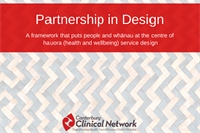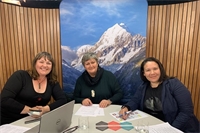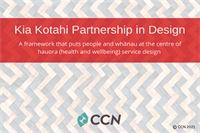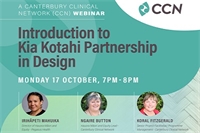26Jan
Kia Kotahi Partnership in Design taking flight
The Kia Kotahi Partnership in Design (KKPID) project team have been busy the past few months socialising the co-design framework to various groups around the motu (country). The values-based framework ensures that people and their whānau are at the centre of designing equitable health services in a genuine and purposeful partnership.
During November Hauora Māori and Equity Lead Ngaire Button, Senior Project Facilitator Koral Fitzgerald and Leadership Team member Wendy Dallas-Katoa presented in Tāmaki Makaurau (Auckland) at the Ko Awatea Research Day.
Principal of co-design at Ko Awatea, Dr Lynne Maher, has been working in co-design for 20 years, both in England and in Aotearoa New Zealand. When Lynne first learned about the Kia Kotahi Partnership in Design (KKPID) framework, she instantly thought it was a brilliant example of authentic co-design.
“The way KKPID has been developed places an emphasis on people – involving people from the very beginning. Typically, co-design starts with a challenge or opportunity based on what the organisation thinks. KKPID asks the community to go on that journey together and build something based on what will work for them,” says Lynne.
“It starts by putting community at the centre, rather than predetermining the problem or opportunity and then consulting with the community. To me, this really sets KKPID apart from other co-design processes.”
“The framework has been developed with Māori in mind, but because a core part of Māori culture is based on respect, understanding and self-determination, which are the core values that underpin KKPID, it will work for all. It’s about enabling people to enable their future.”
“I could see this framework being used widely beyond health – it has applications in transport, social organisations, education, justice and corrections.”
“People who are not used to co-design will find the framework helpful because it gives them guidance, so they know how to approach it and what to do at different stages.”
The framework was used for Pae Ora ki Waitaha, a co-design project to explore how the health system can better support the pae ora (healthy futures) of all members in the community. One of the project participants commented that: ‘Never before have I been involved in a co-design process that’s been as empowering of providers as this experience.
The providers are being heard and promoting what we know works in the communities; this is an opportunity to reduce inequities.’
Koral Fitzgerald believes that one of the many advantages of this framework is the ability for community, providers and funders to be both learners and experts in their own right, particularly during the whai whakaaro (mindful listening and learning) and wawata (dreaming) stages.
The team have also presented at various hui (meetings) across health and wellbeing providers in Waitaha, in addition to Immunisation Advisory Centre New Zealand (IMAC) and Health Quality and Safety Commission (HQSC) and did a webinar during October, which can be viewed here.
Next year the team have been asked to present at the HQSC Consumer Health forum Aotearoa event in Ōtautahi Christchurch on 24 May 2023.
About the Author
Related

A flexible, principles-based framework called partnership in design, which puts people and whānau a...
Read More >

More than 230 people from across Aotearoa signed up for the ‘Introduction to Kia Kotahi Partnership...
Read More >

Members of the Health Quality and Safety Commission (HQSC) tīma (team) were one of the latest to he...
Read More >

Thinking of service redesign but don't know where to start? Want to build services in genuine pa...
Read More >